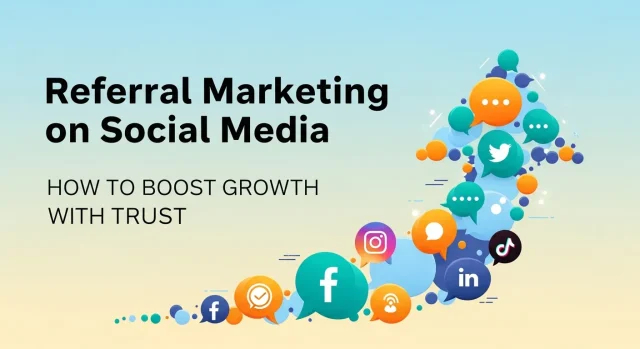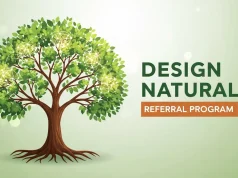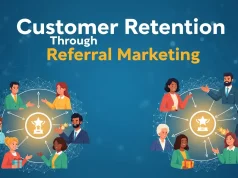Referral marketing on social media helps businesses grow through trusted recommendations, organic sharing, and strong social proof. By combining word-of-mouth with social platforms, brands can drive high-quality leads, improve conversions, and build long-term customer loyalty cost-effectively.
Referral marketing on social media has become one of the most effective ways for businesses to grow in today’s digital world. When people discover a brand through friends, family, or trusted connections, they are far more likely to engage and convert. Social media platforms amplify this trust by making it easy to share recommendations, experiences, and referral links with a wide audience.
Unlike traditional advertising, referral marketing on social media focuses on genuine relationships rather than paid promotions. By combining the power of word-of-mouth with the reach of social networks, businesses can attract high-quality leads, build credibility, and create long-term customer loyalty. In this blog, we’ll explore how referral marketing on social media works, why trust plays a key role, and how you can use proven strategies to drive sustainable growth.
What Is Referral Marketing?
Referral marketing is a strategy that encourages existing customers or users to recommend your products or services to others. This word-of-mouth promotion usually comes with incentives—discounts, rewards, or exclusive offers—that motivate people to share.
Why is referral marketing so powerful? Because people trust recommendations from friends or family more than any ad. According to Nielsen, 92% of consumers trust referrals from people they know over any other form of advertising.
Why Use Social Media for Referral Marketing?
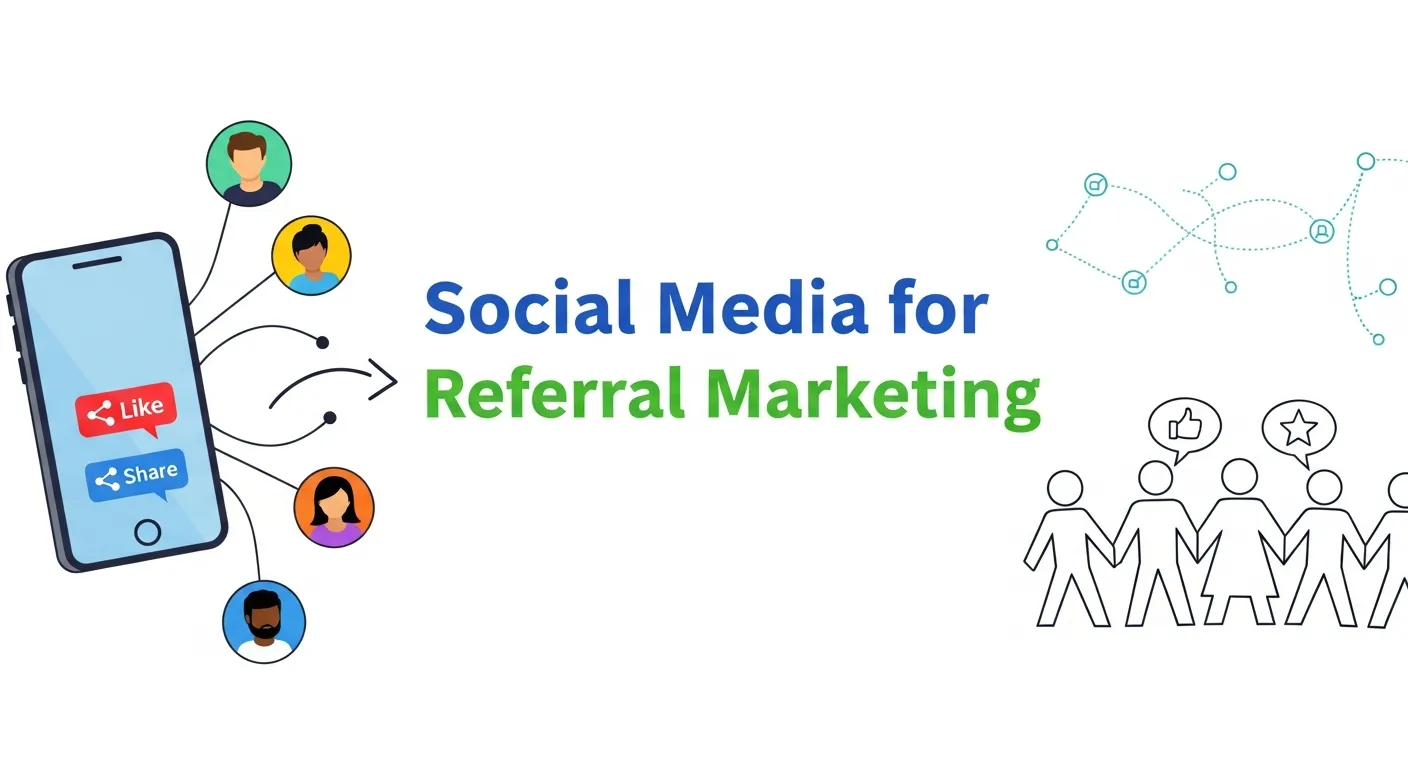
Social media platforms are designed to connect people, encourage interaction, and make sharing effortless. This makes them the perfect environment for referral marketing, where trust, recommendations, and personal connections play a critical role. By combining referral marketing with social media, businesses can significantly amplify their reach, engagement, and conversion potential.
Massive Reach
Social media platforms like Facebook, Instagram, Twitter (X), LinkedIn, TikTok, and Pinterest have billions of active users worldwide. This massive user base allows referral campaigns to spread quickly beyond your immediate customer network. When one customer shares a referral link, it can instantly reach hundreds or even thousands of people, increasing brand visibility and accelerating growth.
Easy and Viral Sharing
Social media makes sharing referral links, posts, and promotions incredibly simple. With just one click, users can share referral offers through posts, stories, direct messages, or group chats. This ease of sharing encourages viral behavior, allowing referral campaigns to scale organically without additional advertising costs.
Strong Social Proof
Likes, comments, shares, and testimonials act as powerful social proof. When people see others engaging positively with your referral content, it builds trust and credibility. This visible engagement reassures potential customers that your brand is reliable, making them more likely to take action on a referral.
Advanced Targeting and Tracking
Social media platforms offer advanced targeting and analytics tools. Businesses can promote referral campaigns to specific audiences based on demographics, interests, and behavior. At the same time, built-in analytics help track clicks, shares, conversions, and overall performance, making referral marketing on social media both measurable and highly optimized.
Choose the Right Social Platforms for Your Referral Program
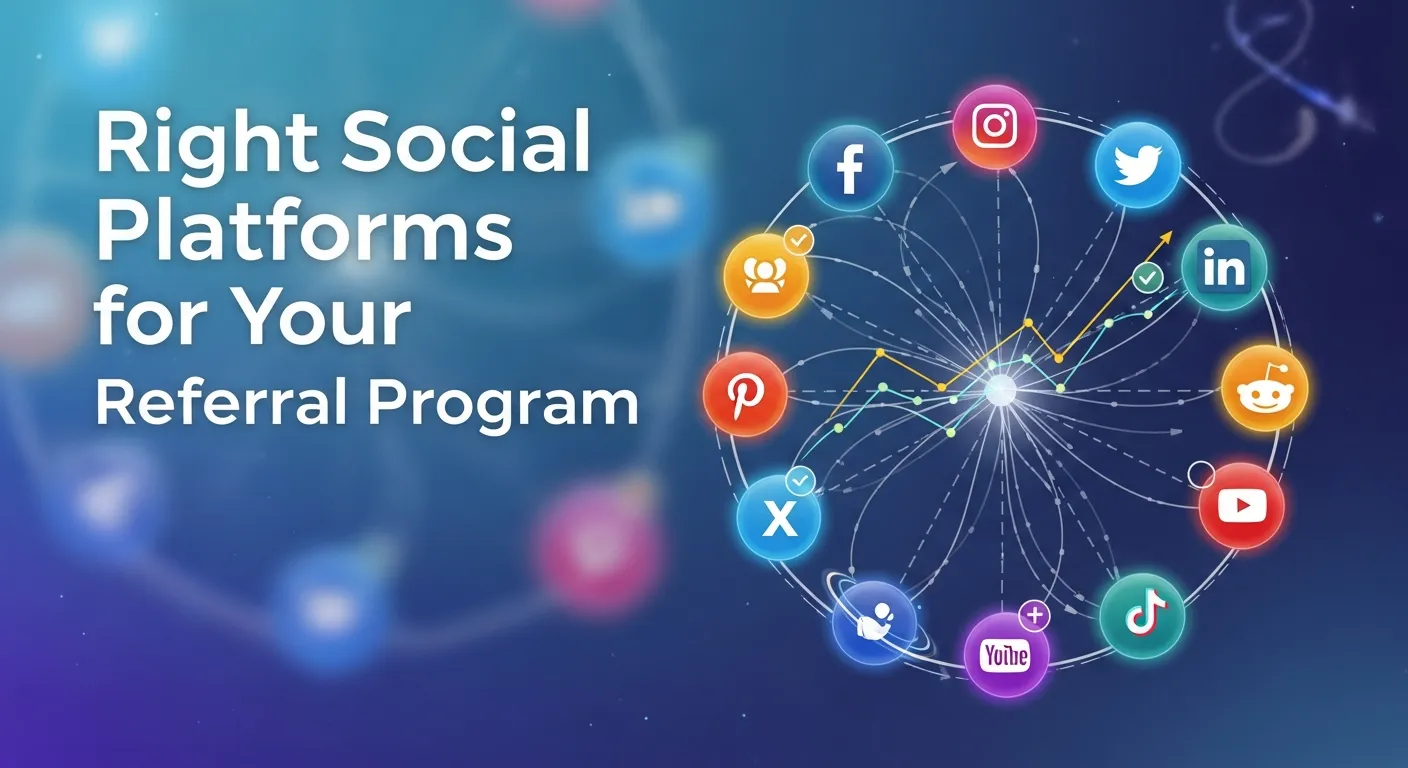
The success of referral marketing on social media largely depends on choosing the right platforms for your audience. Not every social network delivers the same results for every business, so it’s important to understand where your target customers are most active and how they prefer to engage with content. Selecting the right platform ensures your referral program reaches the right people, at the right time, in the right way.
Facebook & Instagram
Facebook and Instagram are ideal for B2C businesses, e-commerce brands, lifestyle products, fashion, beauty, and consumer goods. Facebook’s groups, pages, and sharing features make it easy for users to spread referral links within their communities. Instagram’s visual-first approach, combined with Stories, Reels, and direct messaging, encourages quick engagement and seamless sharing of referral offers.
LinkedIn is the best platform for B2B referral marketing, professional services, SaaS companies, and consultants. Referrals shared on LinkedIn carry strong credibility because they come from professional connections. Thought leadership posts, case studies, and direct messages can be powerful tools for promoting referral programs in a more trust-driven, professional environment.
Twitter (X)
Twitter works well for brands targeting tech-savvy, news-focused, or trend-driven audiences. Its fast-paced nature allows referral campaigns to gain visibility quickly through retweets, mentions, and hashtags. Short referral messages, limited-time offers, and product launches perform especially well on this platform.
TikTok
TikTok is perfect for brands targeting younger audiences with creative, entertaining, and short-form video content. Referral marketing on TikTok thrives on authenticity—users sharing genuine experiences, challenges, or tutorials that include referral links can generate rapid organic reach and engagement.
Pinterest is highly effective for niche markets such as DIY, crafts, home décor, fashion, and lifestyle inspiration. Since Pinterest content has a longer lifespan, referral pins can continue driving traffic and referrals long after they are published, making it a valuable platform for long-term referral marketing efforts.
Design a Simple and Attractive Referral Program
A successful referral marketing program starts with simplicity and strong incentives. If your referral process feels complicated or confusing, users are far less likely to participate—no matter how good the reward is. The goal is to make sharing effortless while offering rewards that genuinely motivate your customers to take action.
Simple Sharing
Make the referral process as seamless as possible. Provide users with unique referral links or codes that can be shared instantly through social media posts, stories, direct messages, or messaging apps. The fewer steps involved, the higher the chances that users will actually share your referral offer.
Clear and Valuable Incentives
Your rewards should be easy to understand and appealing to your target audience. Popular incentives include discounts, free products, cashback, store credits, or early access to exclusive features. Clearly communicate what users will earn and when they will receive it to build trust and excitement.
Dual Incentives
One of the most effective referral marketing strategies is offering dual rewards—benefiting both the referrer and the referred customer. This creates a win-win situation, encouraging more people to participate and increasing conversion rates for new users.
Mobile-Friendly Experience
Since most social media activity happens on mobile devices, your referral pages, links, and sign-up forms must be fully optimized for mobile. A smooth, fast, and responsive mobile experience removes friction and ensures users can complete the referral process anytime, anywhere.
Create Shareable Social Media Content
To make your referral marketing on social media successful, your content must be highly shareable and engaging. People are more likely to share posts that are visually appealing, easy to understand, and clearly communicate the benefit. The right content strategy can turn your audience into active promoters of your referral program.
Use Eye-Catching Visuals
Visual content consistently performs better on social media than text-only posts. Use high-quality images, short videos, reels, stories, or infographics to explain your referral offer. Visuals help grab attention quickly and make your message easier to remember, increasing the chances of sharing.
Include Clear and Strong CTAs
Always tell users exactly what action to take. Clear calls-to-action like “Share this post and get 20% off,” “Invite a friend and earn rewards,” or “Tag someone who would love this” remove confusion and guide users toward sharing your referral link.
Leverage User-Generated Content
User-generated content builds trust and authenticity. Share testimonials, screenshots, reviews, or photos from customers who have successfully used your referral program. When people see real users benefiting, they feel more confident participating and sharing the referral offer themselves.
Create Branded Hashtags
A unique branded hashtag makes your referral campaign easier to track and helps build a community around your program. Encourage users to include the hashtag when sharing referral posts, which boosts visibility and strengthens brand recognition across social platforms.
Promote Your Referral Program on Social Media
Creating a referral program is only the first step—active promotion is what drives real results. To maximize participation and visibility, your referral program needs consistent exposure across your social media channels. Strategic promotion ensures that both existing and potential customers clearly understand the benefits and how to participate.
Pin Referral Posts
Pin your referral campaign posts to the top of your Facebook pages, Instagram profiles, and Twitter (X) feeds. This keeps your referral offer visible at all times, ensuring new visitors immediately see the opportunity to earn rewards by sharing your brand.
Use Stories, Reels, and Short Videos
Short-form content like Instagram Stories, Instagram Reels, and TikTok videos is highly engaging and perfect for explaining referral programs in a fun, creative way. Use quick demos, behind-the-scenes clips, or step-by-step visuals to show how easy it is to refer and earn rewards.
Partner with Influencers
Influencer partnerships can significantly boost the reach of your referral marketing campaign. Collaborate with influencers who align with your brand and audience to promote your referral program authentically. Their recommendations add credibility and encourage followers to trust and participate.
Leverage Paid Social Media Ads
Paid social media advertising allows you to target specific demographics, interests, and behaviors. Promote your referral program through sponsored posts or ads to reach new audiences who are more likely to convert, while tracking performance metrics to optimize results.
Use Social Media Tools to Track and Optimize Referral Marketing
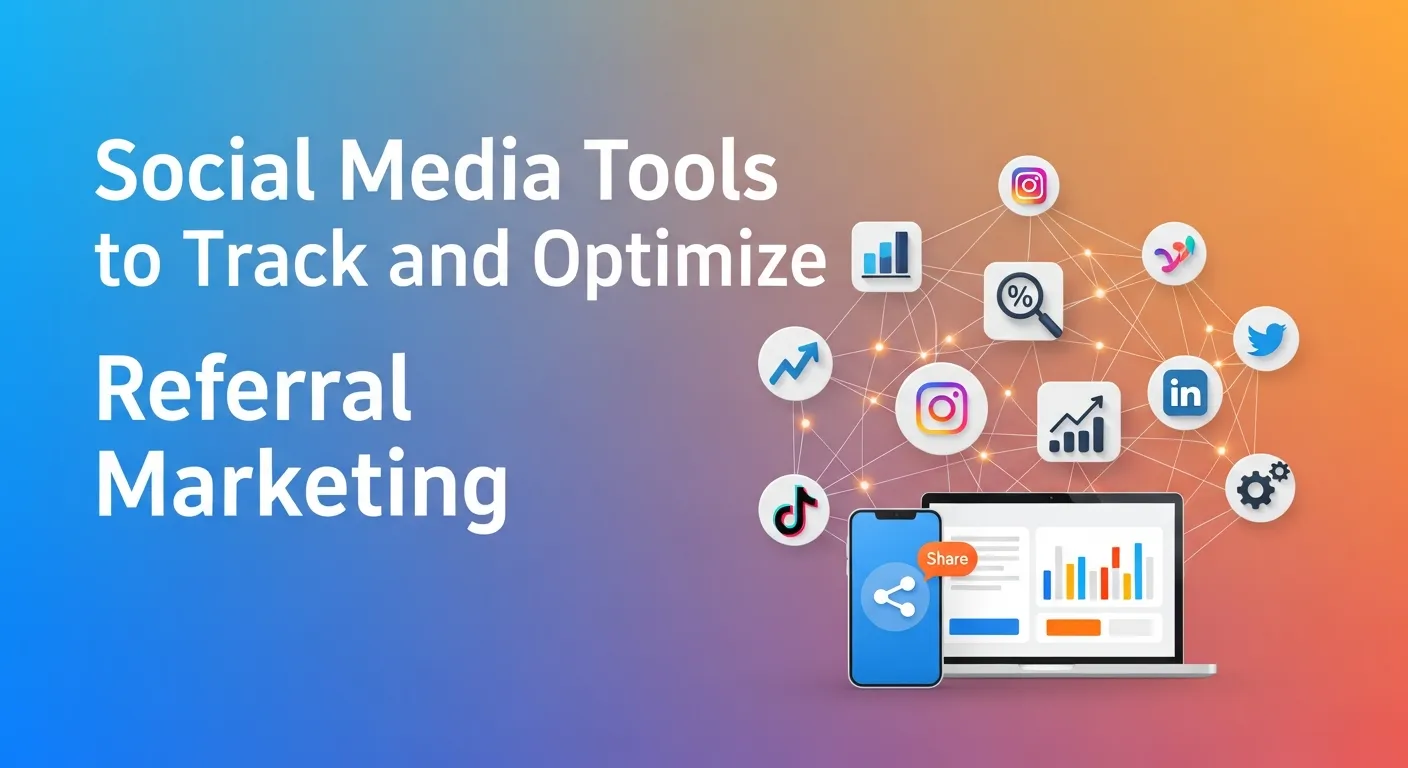
Tracking and optimizing your referral marketing efforts is essential for long-term success. Without proper data and insights, it’s difficult to understand what’s working, what’s not, and where improvements are needed. Social media analytics and referral tracking tools help you measure performance, optimize campaigns, and maximize ROI.
Use Platform Insights and Analytics
Each social media platform provides built-in analytics tools such as Facebook Insights, Instagram Analytics, and LinkedIn Analytics. These tools help you track engagement metrics like clicks, shares, comments, reach, and impressions. By analyzing this data, you can identify which posts and platforms generate the highest referral activity.
Track Performance with UTM Parameters
UTM parameters allow you to add tracking codes to your referral links. This helps you clearly see which social media platforms, posts, or campaigns are driving the most traffic and conversions. With accurate tracking, you can focus more on high-performing channels and refine underperforming ones.
Use Dedicated Referral Software
Referral marketing software simplifies tracking, attribution, and reward distribution. Tools like ReferralCandy automate referral links, monitor conversions, and ensure rewards are delivered accurately. Automation reduces manual effort while improving the user experience for both referrers and new customers.
Build a Continuous Feedback Loop
Encourage participants to share feedback about their referral experience. Use surveys, comments, and direct messages to gather insights. Combine this qualitative feedback with analytics data to continuously optimize incentives, messaging, and content for better referral marketing results.
Tips to Boost Social Media Referral Marketing Success
To get the best results from referral marketing on social media, you need more than just a good program—you need consistent optimization and engagement. These proven tips will help you increase participation, build trust, and turn more customers into active brand advocates.
Leverage Social Proof
Social proof plays a powerful role in influencing behavior on social media. Highlight positive reviews, testimonials, success stories, or screenshots from users who have benefited from your referral program. When potential customers see real people earning rewards or enjoying your product, it builds trust and encourages them to participate.
Create a Sense of Urgency
Urgency motivates action. Use limited-time referral offers, countdowns, or exclusive rewards to encourage quick sharing. Phrases like “Offer ends soon” or “Refer a friend today and earn extra rewards” can significantly increase referral activity.
Engage Actively with Referrers
Engagement builds loyalty. Respond to comments, reply to messages, and publicly thank users who participate in your referral program. Recognizing referrers makes them feel valued and encourages them to continue promoting your brand.
Test Different Referral Offers
Not all incentives work the same for every audience. Experiment with different rewards such as discounts, cashback, free products, or exclusive access. Testing allows you to identify which offers drive the highest engagement and conversions.
Personalize Referral Messages
Encourage users to personalize their referral messages when sharing links. Personal recommendations feel more authentic and trustworthy than generic promotions, increasing the likelihood that friends and followers will take action.
Common Challenges and How to Overcome Them
While referral marketing on social media can deliver impressive results, businesses often face a few common challenges along the way. Identifying these issues early and addressing them with the right strategies helps ensure your referral program remains effective and trustworthy.
Low Participation
Low engagement usually means the referral process is too complicated or the incentives aren’t appealing enough. Simplify the steps required to participate, clearly explain the benefits, and promote the referral program more frequently across your social media channels. Attractive and relevant rewards can significantly boost participation.
Tracking Difficulties
Without proper tracking, it’s hard to measure the success of your referral campaigns. Use reliable referral tracking tools and closely monitor analytics from social media platforms. Accurate tracking helps identify top-performing channels and ensures referrals are correctly attributed.
Spammy or Excessive Sharing
Uncontrolled sharing can make your referral program appear spammy and harm your brand reputation. Set clear guidelines for sharing, limit referral misuse, and actively monitor social media activity to prevent abuse while maintaining authenticity.
Reward Fulfillment Issues
Delayed or unclear reward delivery can damage trust. Ensure your reward system is smooth, transparent, and timely. Clearly communicate reward conditions and delivery timelines so participants feel confident and valued.
Conclusion
Referral marketing on social media is a powerful growth strategy built on trust, authenticity, and community. By choosing the right platforms, creating a simple referral program, sharing engaging content, and tracking performance effectively, businesses can turn loyal customers into brand advocates. When combined with social media’s reach and social proof, referral marketing drives high-quality leads, stronger relationships, and sustainable long-term growth.
FAQ: Referral Marketing on Social Media
1. What is referral marketing on social media?
Referral marketing on social media is a strategy where customers promote a brand by sharing referral links or codes on social platforms in exchange for rewards or incentives.
2. Why is social media effective for referral marketing?
Social media makes sharing easy, provides massive reach, builds social proof, and allows referral campaigns to spread quickly through trusted personal networks.
3. How does referral marketing build trust compared to traditional advertising?
Referral marketing relies on recommendations from friends or family, which people trust more than paid ads, leading to higher engagement and conversion rates.
4. Which social media platforms work best for referral marketing?
Facebook and Instagram work well for B2C brands, LinkedIn is ideal for B2B, TikTok suits younger audiences, and Pinterest is effective for lifestyle and niche markets.
5. What incentives work best in social media referral programs?
Discounts, cashback, free products, store credits, and exclusive access are highly effective incentives for encouraging users to share referral links.
6. How can businesses promote referral programs on social media?
Businesses can use pinned posts, stories, reels, influencer collaborations, and paid ads to increase referral program visibility and participation.
7. How do you track referral marketing performance on social media?
Performance can be tracked using social media analytics, UTM parameters, and referral marketing tools that monitor clicks, conversions, and rewards.
8. What type of content works best for social media referral marketing?
Visual content like short videos, reels, images, testimonials, and user-generated content performs best and encourages higher sharing rates.
9. What are the common challenges in social media referral marketing?
Common challenges include low participation, tracking issues, spammy sharing, and delayed reward fulfillment, all of which can be solved with proper tools and clear rules.
10. Can small businesses benefit from referral marketing on social media?
Yes, referral marketing on social media is cost-effective and ideal for small businesses, helping them grow through trusted recommendations without large ad budgets.
Learn more about: Creating Buyer Personas: The Secret to Smarter Marketing Campaigns

